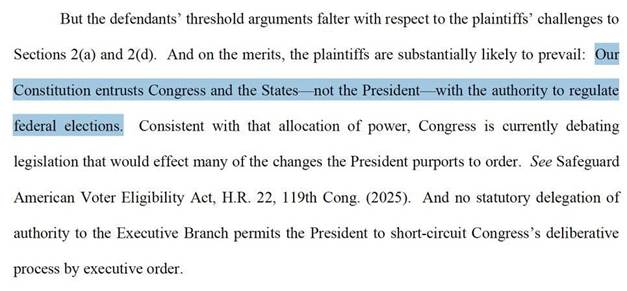Good News: A Court
Rejects Trump's Effort To Suppress The Vote
Nov 01, 2025
In March, Donald Trump issued an
executive order titled “PRESERVING AND PROTECTING THE INTEGRITY OF AMERICAN
ELECTIONS.” Predictably, it was designed to do anything but
that. Its goal was to make it more difficult to register to vote.
In April, Judge Colleen
Kollar-Kotelly, a senior judge in the District of Columbia, issued a
preliminary injunction that temporarily prevented key parts of the executive
order from going into effect while the litigation moved forward. The key
problem Judge Kollar-Kotelly observed was that Trump was trying to usurp the
power the Constitution affords to the states and Congress to run elections.
Friday, the Judge granted summary
judgment in parts of the case, entering a permanent injunction that prevents
the Election Assistance Commission (EAC) from implementing the worst provision
of Trump’s executive order: one that purported to require proof of citizenship
to register to vote.
The measure was designed to suppress
voter participation in elections; a solution in search of a problem. It’s akin
to the poll taxes used in the South before the Supreme Court put an end to
them. Trump’s plan would require people to jump through expensive hoops to
acquire proof of birth and costly forms of identification, like
passports. At least 21 million Americans don’t have
that kind of proof readily available. Only 51% of Americans have passports, which
cost adults applying for the first time a $165.00 fee, not to mention
assembling the documents you need, getting a photograph of yourself, and making
it to an appointment. The problem is especially acute for young people and
students who live away from home, and whose documents are with their parents,
if they have them at all.
The Judge wrote, “The Constitution’s
allocation of authority over federal elections between Congress and the States
may not be intuitive. But it is no accident,” Judge Kollar-Kotelly wrote.
“Instead, this design was the product of carefully considered compromises among
our Constitution’s Framers.” Those compromisers were part of the attention to
avoid rule by a king-a dictator.
Donald Trump has repeatedly tried to
claim he has powers the Constitution does not give to the president. And this
is especially dangerous when it comes to voting, given his track record. We the
people must have the right to choose their leaders, not the other way around.
Tonight, another federal district
judge stood up for the rule of law and for democracy, telling a power hungry
president, “No.”
If you’re looking for something you
can do to support the judiciary in this moment where district court judges are
bravely standing for the rule of law even though they know that means the
president could target them, let them know you support them. Send the Judge and
others a postcard, like we do to encourage voters to participate in elections,
and thank her for standing for the Constitution and the rule of law. It may
seem like a small thing, but the judiciary deserves our support and our thanks
for what they are doing. Let’s be visible and involved. Let’s make sure the
courts know we are paying attention.
It’s good news when a judge blocks
Donald Trump’s autocratic intentions. Here, it’s big news. While the
administration will likely appeal, Judge Kollar-Kotelly has made plain that
this case falls within a basic rule, that when the language of the law is clear,
the courts look no further. The Constitution explicitly says states and
Congress set the rules for elections, not the president. Donald Trump cannot do
whatever he wants to, because Donald Trump is not a king. The rule of law still
stands.
If you find value in this kind of
clear, experience-driven legal analysis, I hope you’ll consider a paid
subscription to Civil Discourse. Your support makes the newsletter possible.
We’re in this together,
Joyce

